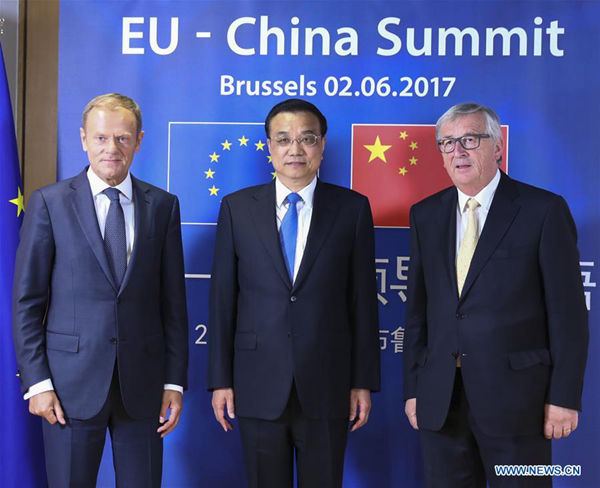EU should grant China Market Economy Status
- By Rabi Sankar Bosu
 0 Comment(s)
0 Comment(s) Print
Print E-mail China.org.cn, June 18, 2017
E-mail China.org.cn, June 18, 2017
|
|
|
Chinese Premier Li Keqiang (C), European Council President Donald Tusk (L) and European Commission President Jean-Claude Juncker co-chair the 19th China-EU leaders' meeting in Brussels, Belgium, June 2, 2017. [Photo/Xinhua] |
Although Chinese Premier Li Keqiang's trip to Germany and Belgium from May 31 to June 2 aided China's diplomatic relations with the two countries, the 19th China-EU leaders' meeting from June 1 to 2 in Brussels ended without a joint consensus about granting Market Economy Status (MES) to China in the World Trade Organization (WTO).
During his meeting with German Chancellor Angela Merkel, German President Frank-Walter Steinmeier, Belgian Prime Minister Charles Michel, European Council President Donald Tusk and European Commission President Jean-Claude Juncker, Li persuaded European leaders to accord the status of "Market Economy" to China and relax their actions regarding the dumping of Chinese goods.
In his keynote speech at the 19th China-EU leaders' meeting, Premier Li Keqiang urged the European Union (EU) to fulfill its obligations under Article 15 of the protocol on China's accession to the WTO, so as to pave the way towards a stable development of China-EU relations. He stressed that Article 15 is a sunset provision and that all sides should act in line with WTO rules.
China became the 143rd member of the WTO on December 11, 2001, after 15 years of arduous and prolonged negotiations. Over the past 15 years, China has made great contributions to the WTO's multilateral trading system as well as to global economic growth.
Since joining the WTO, China has strictly adhered to WTO rules by gradually reducing tariff levels. China has also actively assumed its responsibilities as a major developing trading nation, cutting its overall tariff rate from 15.3 percent to 9.8 percent. It has long been an advocate of free trade, as evidenced by the fact that it has to date signed 14 free trade agreements with 22 countries.
According to Article 15, WTO members should have stopped using the surrogate country approach to conduct anti-dumping investigations on China by December 11, 2016. Under the surrogate country approach, WTO members use costs of production in a third country to calculate the value of products from countries on its "non-market economy" list, which includes China.
China should receive Market Economy Status, which would allow it to enjoy the same market status as the United States and the European Union when it comes to anti-dumping investigations in the WTO. Since the WTO's establishment in 1995, EU members have launched 1,149 trade investigations into China.
In a biased, myopic move, the EU continues to deny Market Economy Status to China on the basis that China is not yet a proper free market. European companies complain that they cannot easily penetrate the Chinese marketplace. Europe does not want to let relatively cheaper Chinese goods flood European markets at a higher rate for fear of undermining local economies. The excuses put forward by the EU are discriminatory.
The EU's censure of China as being accountable for the steel glut in the 28-country bloc is untenable. China's steel exports to the EU are small compared to other countries. China's low value-added steel products are complementary to the EU's steel market portfolio. Without exports from China, the EU would still have to turn to other countries to import similar products. That will not stem job losses in the EU.
China's leadership in boosting regional and global economies through programs such as the "Belt and Road" initiative was supported by WTO reviewers during the sixth round of the Trade Policy Review (TPR) of WTO in Geneva last July.
However, during the meeting with Premier Li Keqiang, Chancellor Angela Merkel confirmed that the EU will offer equal treatment to Chinese enterprises under the protocol on China's accession to the WTO. Belgian Prime Minister Charles Michel said that his country is ready to play an active part to push the EU to fulfill its WTO obligations. But a majority of the EU members has failed to reach a consensus on accepting China's Market Economy Status.
It should be noted that over 80 countries, including Russia, New Zealand, Singapore and Australia, have recognized China's status as a market economy.
In fact, China's "non-market" label has become a wild card to the EU and the U.S. to contain China's exports and shield local industries, which is unfair. As the world's second largest economy and the largest trade partner for more than 130 countries, China has become a bedrock for protecting global free trade.
The EU and U.S. should not continue to look at China through colored glasses. As an important member of the WTO, the EU should designate China as a market economy if it can truly see the bigger picture of EU-China trade, especially at a time when the Trump administration has stepped back from America's traditional role of dominance on trade and development.
Rabi Sankar Bosu, Secretary of New Horizon Radio Listeners' Club, West Bengal, India.
Opinion articles reflect the views of their authors only, not necessarily those of China.org.cn.







Go to Forum >>0 Comment(s)